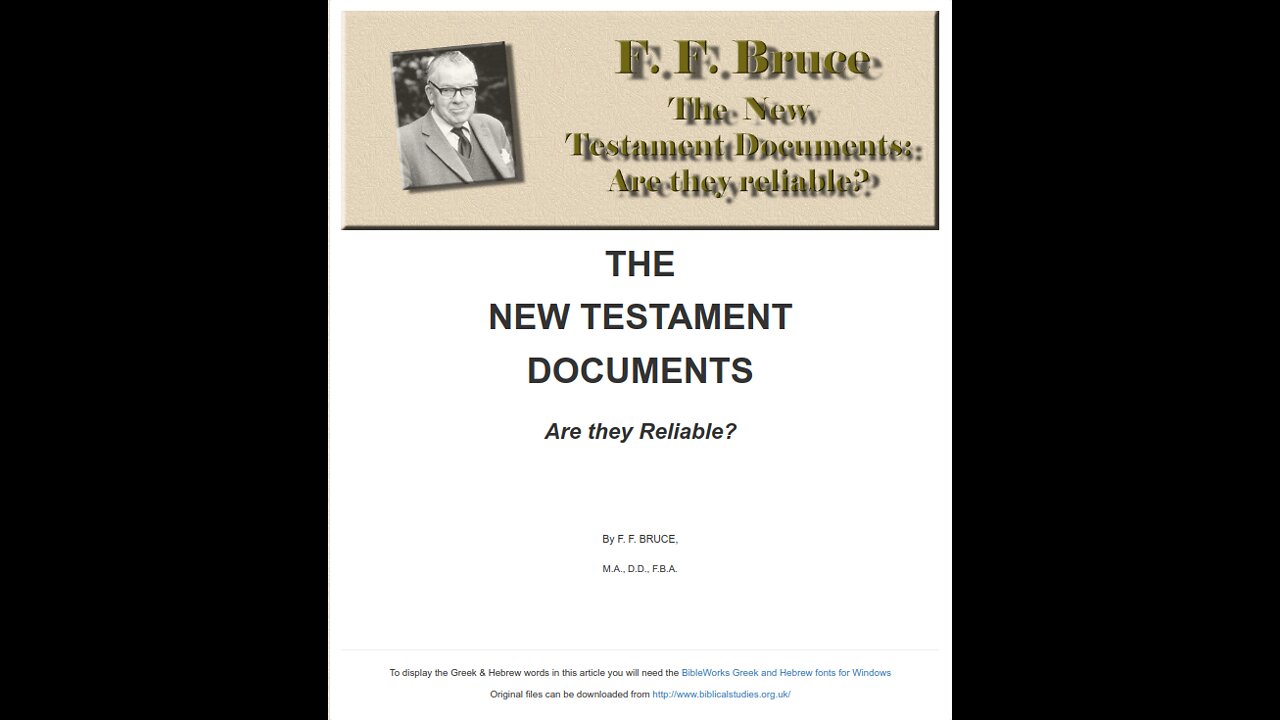Premium Only Content

New Testament Documents - Are They Reliable, By Frederick Fyvie Bruce, Chapter 7
New Testament Documents - Are They Reliable
By Frederick Fyvie Bruce
Table of Contents
TITLE PAGE
PREFACE TO THE FIFTH EDITION
Chapter 1 DOES IT MATTER
Chapter 2 THE NEW TESTAMENT DOCUMENTS: THEIR DATE AND ATTESTATION
Chapter 3 THE CANON OF THE NEW TESTAMENT
Chapter 4 THE GOSPELS
Chapter 5 THE GOSPEL MIRACLES
Chapter 6 THE IMPORTANCE OF PAUL'S EVIDENCE
Chapter 7 THE WRITINGS OF LUKE
Chapter 8 MORE ARCHAEOLOGICAL EVIDENCE
Chapter 9 THE EVIDENCE OF EARLY JEWISH WRITINGS
Chapter 10 THE EVIDENCE OF EARLY GENTILE WRITERS
SUGGESTIONS FOR FURTHER READING
Reliable as what?' asked a discerning reviewer of the first edition of this little work by way of a comment on the title. His point, I think, was that we should be concerned with the reliability of the New Testament as a witness to God's self-revelation in Christ rather than with its reliability as a record of historical fact. True, but the two questions are closely related. For since Christianity claims to be a historical revelation, it is not irrelevant to look at its foundation documents from the standpoint of historical criticism.
When the first edition of this book (my literary firstborn) appeared in 1943, I was a lecturer in classical studies and had for long been accustomed to viewing the New Testament in its classical context. When I was invited from time to time to address audiences of sixth formers and university students on the trustworthiness of the New Testament in general and of the Gospel records in particular, my usual line was to show that the grounds for accepting the New Testament as trustworthy compared very favorably with the grounds on which classical students accepted the authenticity and credibility of many ancient documents. It was out of such talks that this book originally grew. It has (I am told) proved its usefulness to the readers for whom it was intended, not only in English-speaking lands but in German and Spanish translations as well.
The historical and philological lines of approach have, of course, their limitations. They cannot establish the Christian claim that the New Testament completes the inspired record of divine revelation. But non-theological students (for whom the book was written) are, in my experience, more ready to countenance such a claim for a historically reliable work than for one that is not. And I think they are right. It is difficult to restrict a discussion of the New Testament writings to the purely historical plane; theology insists on breaking in. But that is as it should be; history and theology are inextricably intertwined in the gospel of our salvation, which owes its eternal and universal validity to certain events which happened in Palestine when Tiberius ruled the Roman Empire.
I welcome the opportunity to give the book a thorough revision (not thorough enough, some of my friends may think); and in sending it forth afresh, I continue to dedicate it to those university and college students throughout the world who, singly or in groups, maintain among their colleagues the apostolic witness to Jesus Christ our Lord.
F. F. B. April 1959
-
 6:26
6:26
Christian Writings
1 year agoNew Series 24 Hearing and Doing By W J Hocking
105 -
 12:58
12:58
NinjaGamblers
2 hours ago $1.39 earnedIs This The BEST Way to Win At Roulette? 😲
8.33K -
 1:01:54
1:01:54
CharLee Simons Presents Do Not Talk
2 days agoCALIFORNIA'S DONE!
3.79K3 -
 7:33
7:33
MudandMunitions
19 hours agoUnboxing My FIRST Revolver! Smith & Wesson 442 .38 Special and What’s Coming Next for the Channel
7.06K2 -
 1:01:05
1:01:05
Trumpet Daily
23 hours ago $3.56 earnedGermany Started Two World Wars and Now Wants Nuclear Weapons - Trumpet Daily | Mar. 7, 2025
7.08K25 -
 57:07
57:07
Stephen Gardner
16 hours ago🚨BREAKING: Musk STUNS even Trump with LATEST FRAUD DISCOVERY!!
105K215 -
 2:26:47
2:26:47
FreshandFit
12 hours agoRatchet Chick Gets Kicked Out "Gracefully" For THIS...
112K155 -
 2:05:17
2:05:17
TimcastIRL
15 hours agoDemocrat ACTBLUE In CHAOS, Theories Over DOGE Cutting SLUSH FUND Go Wild w/Hotep Jesus | Timcast IRL
240K216 -
 1:11:43
1:11:43
Roseanne Barr
20 hours ago $56.56 earned"They are all Monsters" | The Roseanne Barr Podcast #89
113K147 -
 9:26:16
9:26:16
Dr Disrespect
1 day ago🔴LIVE - DR DISRESPECT - WARZONE - PR ATTEMPTS
160K33